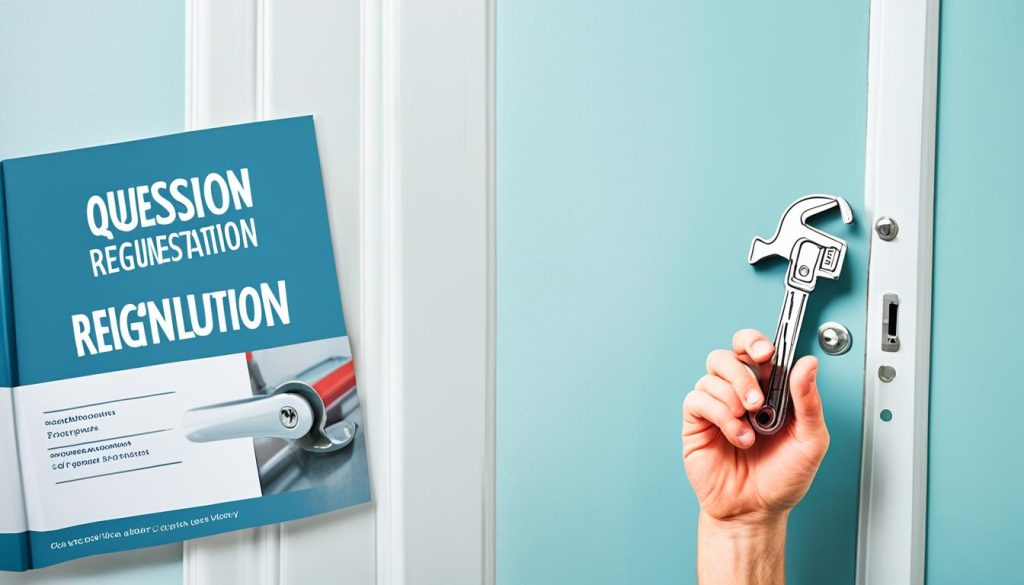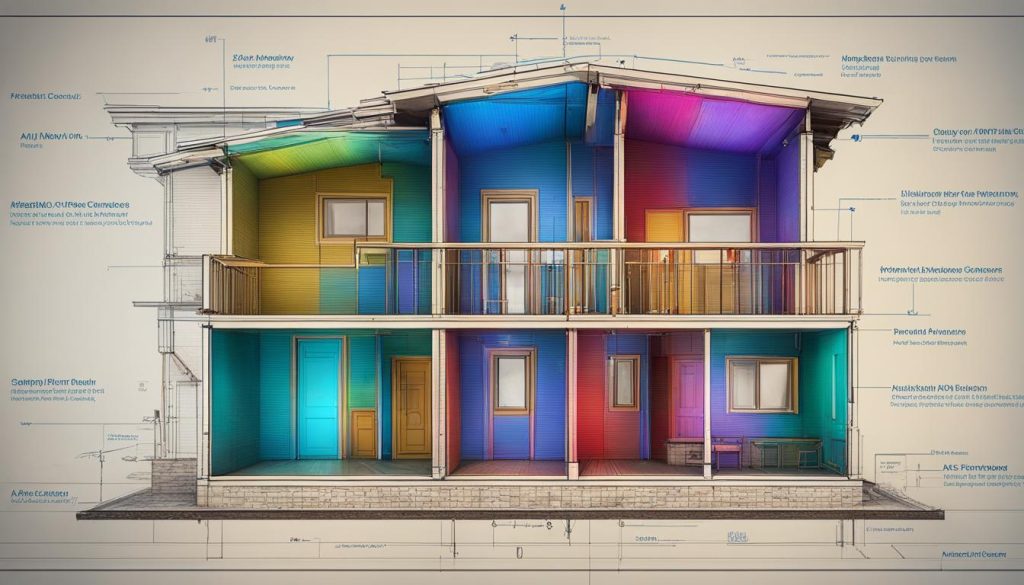Plumbing Permit Guide: When Is It Required?
Did you know that plumbing permits are required for various purposes, including installing plumbing fixtures, altering existing plumbing systems, and installing in-ground swimming pools? Understanding when a plumbing permit is necessary can save you time, money, and potential legal consequences.
Key Takeaways:
- Plumbing permits are required for various plumbing-related activities.
- Minor repairs, fixture replacements, and blockage removal typically do not require permits.
- The process of obtaining a plumbing permit involves providing necessary evidence and going through a review period.
- The cost of a plumbing permit can vary, and it is advisable to refer to the official fee schedule.
- Specific rules and regulations regarding plumbing permits may vary depending on the jurisdiction and the type of project.
Plumbing Permit Application and Procedures
When it comes to obtaining a plumbing permit, there are specific application and procedural requirements that need to be followed. Here’s what you need to know:
1. Valid Building Permit
Before applying for a plumbing permit, it is essential to ensure that a valid building permit has been issued. This requirement may not apply if the work is exclusively related to plumbing.
2. Required Documentation
When submitting a plumbing permit application, you will need to provide certain documentation to support your application. This includes:
- Evidence of plumbing trade qualification
- A current city business license (for contractors)
- Proof of home ownership
3. Review and Processing
Once your plumbing permit application has been submitted, it will go through a review and processing period. The duration of this process is a minimum of 48 hours. However, the timeline can be influenced by various factors, such as the volume of applications, complexity of the project, and the accuracy of your application.
4. Issuance of Permit
If your application is approved, a plumbing permit will be issued to you. You will receive a copy of the permit as proof of authorization to proceed with the plumbing work.
Remember, it is crucial to adhere to the plumbing permit application process and procedures to ensure compliance with local regulations. By following the correct steps, you can obtain the necessary permits and avoid any legal or financial issues.
Do You Need a Permit?
In order to determine if a permit is required for your plumbing work, it is important to consider the specific nature of the project. Generally, a plumbing permit is needed when there is construction, extension, or alteration of a plumbing system, including the replacement of water and sewer lines. However, permits are not required for minor repairs, faucet and fixture replacements, or drainage blockage removal.
As a homeowner, you may be eligible to obtain plumbing permits if you meet certain legal requirements. This typically includes owning the home and intending to reside in it. It’s essential to note that different rules and regulations may apply to specific types of properties, such as apartment-style condos or semi-detached dwellings. To ensure compliance, it’s crucial to familiarize yourself with the residential plumbing permit rules in your area.
Types of Plumbing Work Requiring Permits:
- Construction, extension, or alteration of a plumbing system
- Replacement of water and sewer lines
Examples of Plumbing Work Not Requiring Permits:
- Minor repairs
- Faucet and fixture replacements
- Drainage blockage removal
| Permit Requirement | Residential Plumbing Work |
|---|---|
| Permit Required | Construction of a new plumbing system |
| Permit Required | Extension or alteration of an existing plumbing system |
| Permit Required | Replacement of water and sewer lines |
| No Permit Required | Minor repairs |
| No Permit Required | Faucet and fixture replacements |
| No Permit Required | Drainage blockage removal |
How Much Will It Cost?
The cost of obtaining a plumbing permit can vary depending on the specific requirements and regulations set by the relevant authorities. It is important to refer to the permit fee schedule provided by the local municipality to determine the accurate and up-to-date fees applicable to your project. The permit fee schedule outlines the costs associated with different types of plumbing permits, ensuring transparency and consistency in the permit application process.
The fees for plumbing permits may differ based on factors such as the scale and complexity of the project. Homeowners who are planning to undertake the plumbing work themselves may be eligible for homeowner permits, which can have different fee structures compared to permits obtained by contractors. Consulting the fee schedule or contacting the appropriate agency will provide precise information on plumbing permit costs applicable to your specific situation.
Understanding the costs associated with plumbing permits is essential for budgeting and planning purposes. By familiarizing yourself with the permit fee schedule, you can ensure that you allocate the necessary funds to cover the permit expenses alongside other project-related costs. It is advisable to consult the fee schedule early in the planning process, as permit fees may be subject to change and may impact your overall project budget.
What Are the Rules?
In order to ensure compliance with plumbing permit regulations, it is crucial to understand the rules that govern the process. The specific rules may vary depending on the jurisdiction and the nature of the project. As a homeowner, it is essential to familiarize yourself with these rules to avoid any potential penalties or legal and financial issues. Let’s explore some key aspects of plumbing permit regulations and homeowner permit eligibility.
Homeowner Permit Eligibility
As a homeowner, you may be eligible to obtain plumbing permits for certain types of work. However, eligibility requirements typically include:
- Legal ownership of the property: You must be the legal owner of the property where the plumbing work will be carried out.
- Intent to reside in the property: The permits are generally issued for homeowners who intend to reside in the property.
- Personal involvement in the work: Homeowners may need to demonstrate their personal involvement and ability to complete the plumbing work.
It’s important to note that for certain types of residences, such as apartment-style condos or semi-detached dwellings, homeowners may need to hire a licensed contractor to obtain the necessary permits.
Following Regulatory Guidelines and Plumbing Codes
When obtaining plumbing permits, it is crucial to adhere to all regulatory guidelines and plumbing codes applicable in your jurisdiction. These codes are designed to ensure safety, efficiency, and proper installation of plumbing systems. Violating these guidelines can result in serious consequences and may compromise the functionality and safety of your plumbing system. Therefore, it is essential to consult the relevant regulatory bodies or local authorities to obtain accurate information regarding plumbing regulations and codes.
The Significance of Obtaining Permits
Obtaining the necessary permits is not just a legal requirement but also serves to protect the homeowner’s interests. By obtaining permits, homeowners can ensure that the plumbing work meets all safety and quality standards. It also provides assurance that the work has been reviewed and approved by professionals, thereby reducing potential risks and liabilities. Failure to obtain permits may lead to penalties, delayed projects, and even legal consequences.
Remember, plumbing permit regulations exist to safeguard the integrity of plumbing systems and protect homeowners from potential hazards. By understanding and adhering to these regulations, you can ensure a smooth and compliant plumbing project.
Penalties for Not Obtaining Plumbing Permits
| Violation | Penalties |
|---|---|
| Performing plumbing work without a permit | Financial penalties (varies depending on jurisdiction) |
| Fines for non-compliance with plumbing codes | Financial penalties (varies depending on jurisdiction) |
| Project stoppage or demolition | Halting of work Cost of removing non-compliant work Cost of re-permitting and re-inspection |
| Compromised safety and potential hazards | Increased risk of plumbing failures Potential damage to property Health and safety risks |
Additional Resources
As you navigate the world of plumbing permits, it’s helpful to know that there are various resources available to assist you. Whether you’re a homeowner, builder, or contractor, these resources can provide valuable information and support for your plumbing projects.
One such resource is the technical assistance centers, where safety codes officers are ready to offer guidance and answer any questions you may have. These knowledgeable professionals can help you understand the permit requirements and ensure that your plumbing work meets the necessary standards.
Inspections are another crucial aspect of the plumbing permit process. For specific projects, inspections are required, and you can request them through the appropriate channels. These inspections help ensure that your plumbing work is safe, code-compliant, and meets the necessary quality standards.
Additionally, homeowners can find helpful information and checklists related to specific permit types. If you’re embarking on a project that involves PSTS, hydronic, or solar thermal permits, these resources can provide valuable guidance and checklist templates to help you stay organized and ensure all requirements are met.
Other resources include information on gas regulations, estimating permit fees, and cross-connection control programs. These resources can help you understand the specific requirements and regulations surrounding your plumbing project and provide you with the knowledge necessary to complete it successfully.
When it comes to plumbing permits, knowledge is key. By consulting these additional resources, you can tap into technical assistance, receive guidance on inspections, and access helpful information and checklists specific to different permit types. Take advantage of these resources to ensure that your plumbing project is a success and meets all the necessary requirements.
Source Links
- https://www.calgary.ca/development/permits/plumbing-gas.html
- https://www.newwestcity.ca/plumbing-permits/plumbing-permit-guide
- https://www.calgary.ca/development/home-building/trades-permits.html
- Investing Wisely: How Windows & Doors in Boost Property Value and Financial Health - April 24, 2025
- The Financial Impact of Personal Injuries: Why Legal Help Matters for Business Owners - April 16, 2025
- The Hidden Financial Costs of Domestic Assault: What Business Owners Need to Know - April 16, 2025













